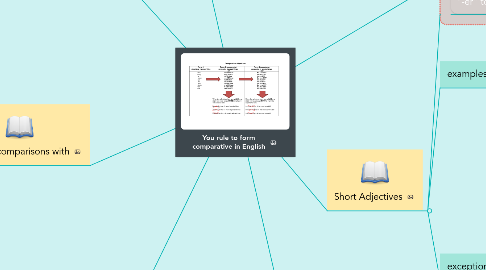You rule to form comparative in English
by YohFT Rmbtz


1. Realizing comparisons in affirmative prayers:
1.1. For affirmative prayers we use the word "than" after the comparative one to carry the comparison out:
1.2. Examples singular: 1.- Victor is taller than Adrian 2.- Marcela is uglier than Karla.
1.3. Examples plural: 1- Those shoes are better than yours. 2.- Elephants are bigger than tigers.
1.4. When we do not mention 2 things it is not used "than": example: That book is cheaper
2. Realizing comparisons with
2.1. "less": less + adjective
2.2. Examples: 1.- This country is less dangerous than yours. 2.- Paty is less extroverted than Mary.
3. Realizing comparisons in negative prayers:
3.1. In negative prayers we use the form of denial in verb "to be" and the structure "expert adjective grasp", depending if we speak in singular or plural.
3.2. Examples singular: 1.- I'm not as fat as John. 2.- Lucy is not as shy as Kate.
3.3. Examples Plural: 1.- Scary movies are not as fun as comedies. 2.- Dogs are not as clean as cats.
4. VIDEO
5. Adjectives with comparative special
5.1. Some adjectives have a special comparative form: Examples: good / better (good / better) bad / worse (bad / worse)
6. Short Adjectives
6.1. For most of the adjectives with a syllable (short adjectives), we add the completion "-er" to form its comparative one:
6.2. examples
6.2.1. small / smaller cool / cooler cheap / cheaper fast / faster clean / cleaner
6.3. exceptions Short Adjectives
6.3.1. a) For short adjectives that end in "- and", only to add "-r": Examples: wide / wider nice / nicer safe / safer
6.3.2. b) For short adjectives that end in "- and", to change the "y" for "i" and to add completion "-er": Examples: dry / drier heavy / heavier happy / happier
6.3.3. c) For short adjectives that end in a vowel and a consonant, to do consonant double and to add "-er": Examples: fat / fatter thin / thinner big / bigger

